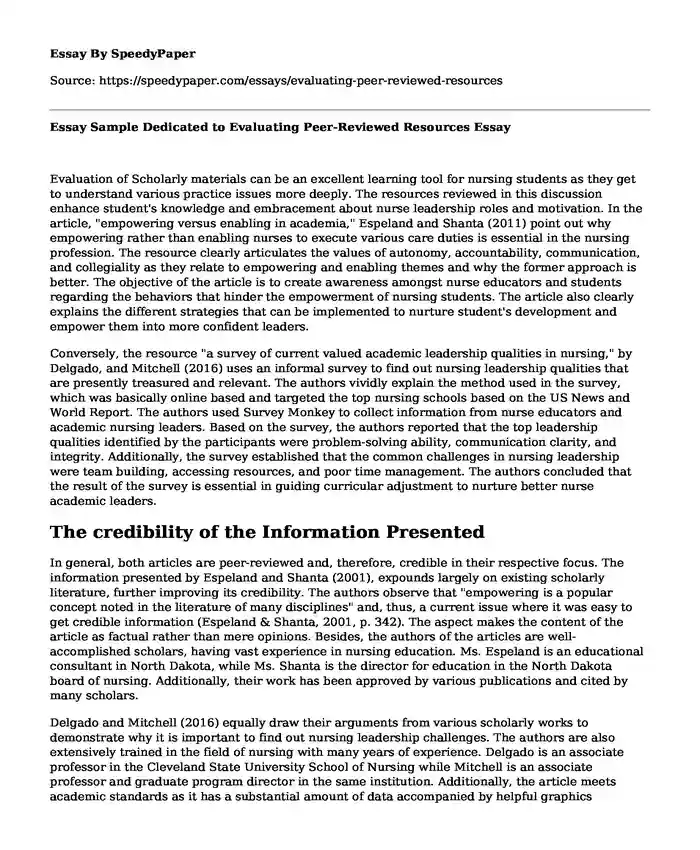Evaluation of Scholarly materials can be an excellent learning tool for nursing students as they get to understand various practice issues more deeply. The resources reviewed in this discussion enhance student's knowledge and embracement about nurse leadership roles and motivation. In the article, "empowering versus enabling in academia," Espeland and Shanta (2011) point out why empowering rather than enabling nurses to execute various care duties is essential in the nursing profession. The resource clearly articulates the values of autonomy, accountability, communication, and collegiality as they relate to empowering and enabling themes and why the former approach is better. The objective of the article is to create awareness amongst nurse educators and students regarding the behaviors that hinder the empowerment of nursing students. The article also clearly explains the different strategies that can be implemented to nurture student's development and empower them into more confident leaders.
Conversely, the resource "a survey of current valued academic leadership qualities in nursing," by Delgado, and Mitchell (2016) uses an informal survey to find out nursing leadership qualities that are presently treasured and relevant. The authors vividly explain the method used in the survey, which was basically online based and targeted the top nursing schools based on the US News and World Report. The authors used Survey Monkey to collect information from nurse educators and academic nursing leaders. Based on the survey, the authors reported that the top leadership qualities identified by the participants were problem-solving ability, communication clarity, and integrity. Additionally, the survey established that the common challenges in nursing leadership were team building, accessing resources, and poor time management. The authors concluded that the result of the survey is essential in guiding curricular adjustment to nurture better nurse academic leaders.
The credibility of the Information Presented
In general, both articles are peer-reviewed and, therefore, credible in their respective focus. The information presented by Espeland and Shanta (2001), expounds largely on existing scholarly literature, further improving its credibility. The authors observe that "empowering is a popular concept noted in the literature of many disciplines" and, thus, a current issue where it was easy to get credible information (Espeland & Shanta, 2001, p. 342). The aspect makes the content of the article as factual rather than mere opinions. Besides, the authors of the articles are well-accomplished scholars, having vast experience in nursing education. Ms. Espeland is an educational consultant in North Dakota, while Ms. Shanta is the director for education in the North Dakota board of nursing. Additionally, their work has been approved by various publications and cited by many scholars.
Delgado and Mitchell (2016) equally draw their arguments from various scholarly works to demonstrate why it is important to find out nursing leadership challenges. The authors are also extensively trained in the field of nursing with many years of experience. Delgado is an associate professor in the Cleveland State University School of Nursing while Mitchell is an associate professor and graduate program director in the same institution. Additionally, the article meets academic standards as it has a substantial amount of data accompanied by helpful graphics illustration to systematically show the survey process and the findings.
Applicability of the Resources in the Nursing Academia Profession
The content in the two articles can be applied in various ways to in the profession of nursing academia. Espeland and Shanta' (2001) equips one with essential information on the strategies that he or she can use to help empower students into confident practitioners and leaders. The article has helped me realized that self-confident nurses with properly developed problem-solving skills, and capability to adapt fast to changing environments and technology provide better services to their clients.
Delgado and Mitchell (2016) offer one essential information about the valued and relevant academic leadership education that helps sensitizes on the qualities and issues relevant in the present day nurse education. Knowing the qualities of competent nursing leadership as well as the challenges faced by leaders in achieving educational goals is critical in my profession as it helps me to smoothly transition from nursing student to nursing academic leader.
Example as a nursing professor on the information learned within the 2 articles
As a nursing professor can give an example of a formal power as critical for empowering nurses based on the information by Espeland and Shanta (22001). Nurses should be adequately equipped with formal power to participate in the autonomous work unit and care management in health institutions. For instance, a senior staff nurse has the chance to be a Charge Nurse in each ward tasked with the management of their respective ward. Additionally, the ward staff nurse is allowed to participate in the infection control department and, therefore, requires to be a good communicator and be strong in the values of integrity and problem-solving as identified by Delgado and Mitchell (2016). Noteworthy is that for a successful empowerment, nurses need to have good leadership skills to adjust to changing situations and solve the arising problems.
References
Delgado, C., & Mitchell, M. M. (2016). A survey of current valued academic leadership qualities in nursing. Nursing education perspectives, 37(1), 10-15.
Espeland, K., & Shanta, L. (2001). Empowering versus enabling in academia. Journal of Nursing Education, 40(8), 342-346.
Cite this page
Essay Sample Dedicated to Evaluating Peer-Reviewed Resources. (2022, Jul 07). Retrieved from https://speedypaper.net/essays/evaluating-peer-reviewed-resources
Request Removal
If you are the original author of this essay and no longer wish to have it published on the SpeedyPaper website, please click below to request its removal:
- Essay Sample on State of Integration Technology in Education
- Recidivism Research Essay Sample
- Free Essay about Social Media and Its Effects on Interaction Patterns
- General Definition and Origin of Ecclesiology. Essay Example
- Essay Example: Why I Want to Become a Nurse Practitioner
- Free Essay: Elaboration on the Role of Non-Health Factors in Behavior Change
- Paper Example. Purpose of Cognitive or Conceptual Maps.
Popular categories





